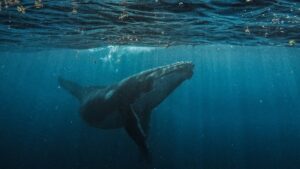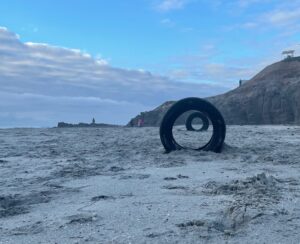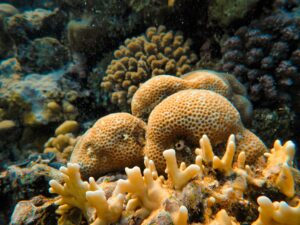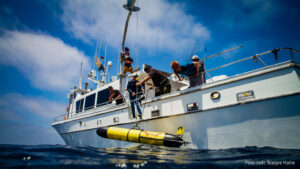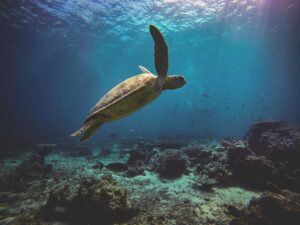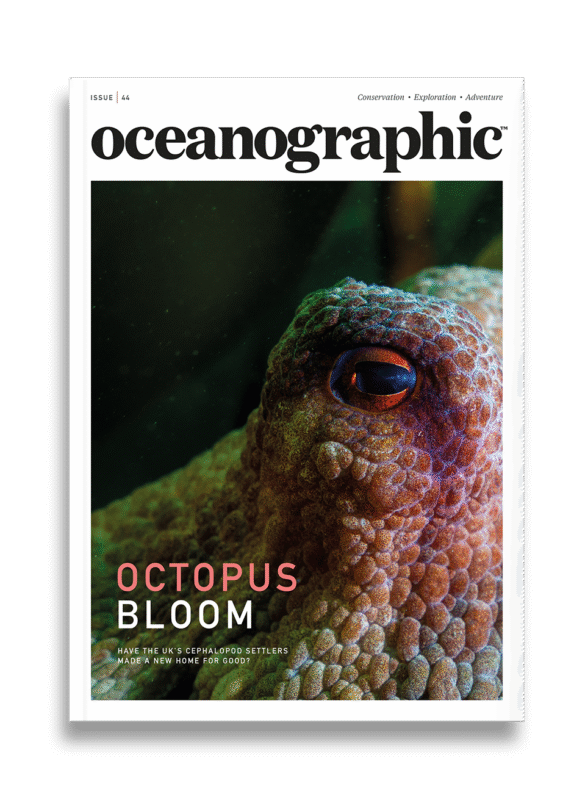Ocean with David Attenborough - the strongest plea of a lifetime
Within Ocean, Sir David Attenborough - an icon of natural history storytelling - is a man finally delivering what he has called “one of the most important films of his career.” And there’s no mistake, this is David Attenborough as we’ve never seen him before.
Now – at 99 years old Sir David Attenborough – a hero of natural history storytelling, is ready to have a frank and honest conversation about the ocean. It’s just as he puts it in the cinematic release launched worldwide today, his 99th birthday, that “after almost 100 years on the planet, I now understand the most important place on Earth is not on land, but at sea.”
And what’s happening at sea needs to be addressed directly.
The cinematic release is called ‘Ocean with David Attenborough’ and it is tipped by those across the ocean sector to be something of a seismic cultural moment. With the launch of a coinciding book ‘Ocean – Earth’s Last Wilderness’ written with his long-time collaborator Colin Butfield, and a blue carpet premiere joined by King Charles at the Royal Festival Hall in London this week, for all intents and purposes – it is.
Within Ocean, Sir David is a man who – having spent his working life documenting the vastness of the natural world – is finally delivering what he has called “one of the most important films of his career.” And there’s no mistake, this is David Attenborough as we’ve never seen him before.
Because at 99-years-old, the globally-revered broadcaster knows he won’t get to see how this story ends. Ocean is, therefore, his last message to the world and a final attempt to sway the narrative. Unlike the work that has come before it, Ocean is not just another love letter to the planet. It’s not even just a love letter to the ocean. It’s a profound and direct call to humanity to come together and protect it. Not just for the sake of nature. But for the sake of ourselves.
It is – as our narrator tells us – a film compounding the most exciting and most important scientific discoveries made within marine biology in the last 20 years. The most crushing of all being – of course – that after years of industrial extraction and destruction – primarily through the practice of bottom-trawling, something at the heart of this film – our Ocean is very much on the ropes. And it’s this message that Sir David wants heard loud and clear.
Of course, a production of this scale would come with a list of names to whom those in the ocean sector will already be very familiar, from Professor Callum Roberts (an Oceanographic Columnist and Head of Marine Biology at the University of Exeter) a scientific advisor through whom the film’s narrative was extrapolated and the fine minds at Blue Marine Foundation, National Geographic, and Arksen; to those responsible for its direction and production: the celebrated Keith Scholey, Colin Butfield, and Toby Nowlan.
Not to mention, of course, the masterful underwater camera work from Douglas Anderson – a man who has gone the distance to bring us closer to the ocean and the life within it than has ever been done before, certainly for something of this magnitude.

His work is at its best here during a sequence upon the open ocean. A large baitball that has risen from the deep becomes the focal point as his camera takes us gently through its centre to witness the abundance of marine life – tuna the size of cars, seals, dolphins, sharks – springing forth past the camera like a well-choreographed cabaret. Except this isn’t choreographed. This is a moment of nature’s sheer spontaneity, captured on camera in a masterful display of life.
It’s moments like this, of course, that can’t be directed – merely observed and filmed. A reminder that – more often than not – it would benefit us to simply allow nature to do its thing, because the results may be grander than anything we try to construct.
At the heart of Ocean is the soaring cost of human impact. Particularly that driven through the destructive fishing practice, bottom-trawling – an unbiased, unhinged act of scouring the seabed to scoop up everything and anything in its path. The heartbreaking part is that two-thirds of this catch is typically discarded.
From flashes of vibrant and abundant seabeds filled with colour we switch to panning shots of swathes of seafloor churned up, destroyed and reminiscent of a “nuclear winter”. The sobriety of the moment is supplemented by a film score worthy of the occasion. Composed by Steven Prince (Gravity, 2013) it sets out to do one thing and one thing only – exploit you for your every emotion. And it does it well.
Because this, without a shadow of a doubt, is an activist film, designed to make you feel it all: rage and devastation, yes, but more importantly empowerment, and crucially hope.
From the Sussex coastline and wrapping his arms around humanity, Sir David Attenborough makes his final plea. His most exciting discovery is that the sea – the Earth’s support system – can bounce back. He saw it before, in 1986 when the world’s population of all species of whales was brought back from the very brink of extinction by government action.
David tells us he won’t see how the story of the Ocean ends, “but after a lifetime of exploring our planet, I remain convinced that the more people enjoy and understand the natural world, the greater our hope of saving both it and ourselves becomes.”
Ocean with David Attenborough is in cinemas across the world now. It will roll out to Disney+ on June 8th this year.


"*" indicates required fields
Printed editions
Current issue
Back issues
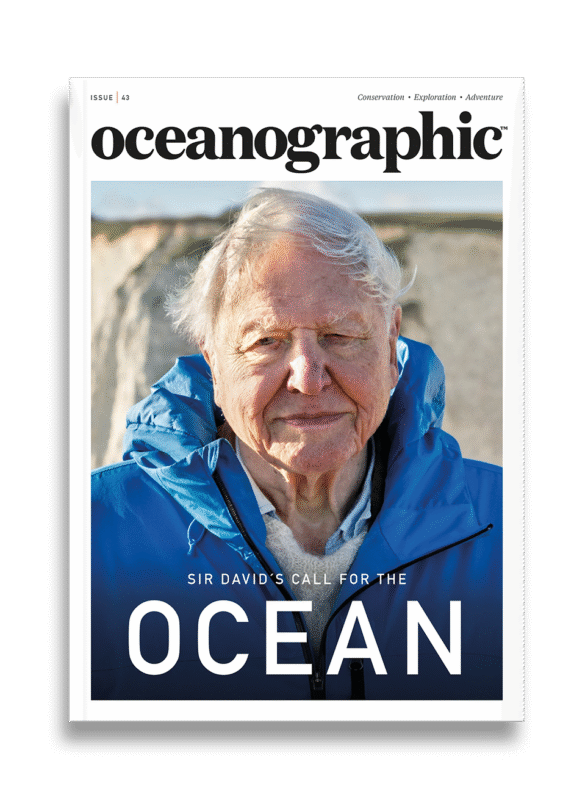
Back Issues
Issue 43 Sir David Attenborough’s ‘Ocean’

Back Issues
Issue 41 Holdfast to the canopy
Enjoy so much more from Oceanographic Magazine by becoming a subscriber.
A range of subscription options are available.

